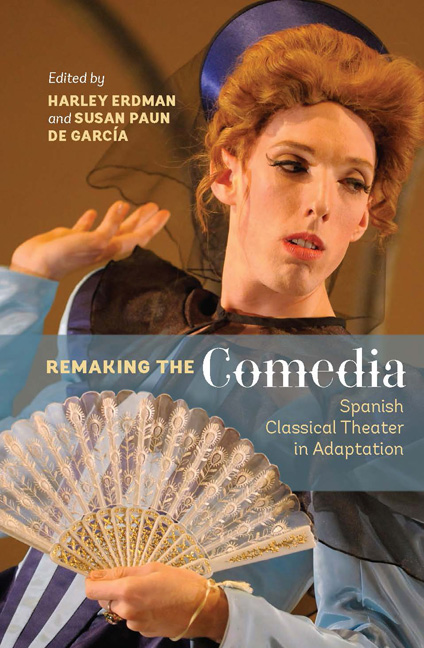Book contents
- Frontmatter
- Contents
- Illustrations
- Contributors
- Preface
- Note to the Reader
- Acknowledgements
- PART I THEORIZING
- PART II SURVEYING
- PART III SPOTLIGHTING
- PART IV SHIFTING
- 21 Porous Boundaries: novela or comedia?
- 22 Lope de Vega and Lenfilm: The Dog in the Manger's Cross-Cultural Journey
- 23 Classical Theater and Puppetry: La Máquina Real
- 24 Remaking Moreto's El desdén con el desdén: From Author's Text to Director's Text
- 25 Lope's Peribáñez on the Lyric Stage
- 26 A Musical Marta
- Play Titles Cited
- Works Cited
- Index
22 - Lope de Vega and Lenfilm: The Dog in the Manger's Cross-Cultural Journey
from PART IV - SHIFTING
Published online by Cambridge University Press: 05 December 2015
- Frontmatter
- Contents
- Illustrations
- Contributors
- Preface
- Note to the Reader
- Acknowledgements
- PART I THEORIZING
- PART II SURVEYING
- PART III SPOTLIGHTING
- PART IV SHIFTING
- 21 Porous Boundaries: novela or comedia?
- 22 Lope de Vega and Lenfilm: The Dog in the Manger's Cross-Cultural Journey
- 23 Classical Theater and Puppetry: La Máquina Real
- 24 Remaking Moreto's El desdén con el desdén: From Author's Text to Director's Text
- 25 Lope's Peribáñez on the Lyric Stage
- 26 A Musical Marta
- Play Titles Cited
- Works Cited
- Index
Summary
The 1977 musical comedy The dog in the Manger, directed by yan Frid and produced by the prominent studio Lenfilm, is now considered a classic of Soviet cinema. The extraordinary success of this filmic version of Lope de Vega's masterpiece can be attributed as much to the director and the stellar cast as to the music written by Gennady Gladkov, one of the country's most sought-after film composers. A quick look at today's Russian film forums serves to illustrate this point: “When The Dog is on TV, I always try to watch it! Especially, because of the songs!” (Kinopoisk); “Love for this film began with the songs” (KinoSait); “I love this film … Such wonderful songs, I sang them again and again as a child!” (Kino-Teatr); “I really love this version of lope de Vega's play … Broadway musicals pale in comparison!” (Imhonet). In fact, while very few of my compatriots will identify a Lope quote as easily as “To be or not to be” or “Happy families are all alike,” almost anyone who has lived in Russia in the last thirty-five years will recognize Marquis Ricardo's serenade “Beautiful Diana,” sung by the famous actor Nikolai Karachentsov in Frid's film. This is why I was immediately able to see this particular scene's influence in the most recent staging of the play by the Spanish National Classical Theater Company (CNTC), premiered in Almagro in July 2011.
Since I myself had given the director Eduardo Vasco a copy of the Soviet film after our conversation about my research on the reception of Lope's theater in Soviet Russia in October 2010, I wasn't completely shocked. I did, however, begin to reflect on how my individual experience made it possible for a Sovietera film to serve as an inspiration for a 2011 Spanish production. What I find most riveting about this space and time travel is that, as a result, we have one of the Spanish national playwright's most popular plays, produced by the National Theater of Spain, created under foreign influence.
- Type
- Chapter
- Information
- Remaking the ComediaSpanish Classical Theater in Adaptation, pp. 219 - 228Publisher: Boydell & BrewerPrint publication year: 2015



